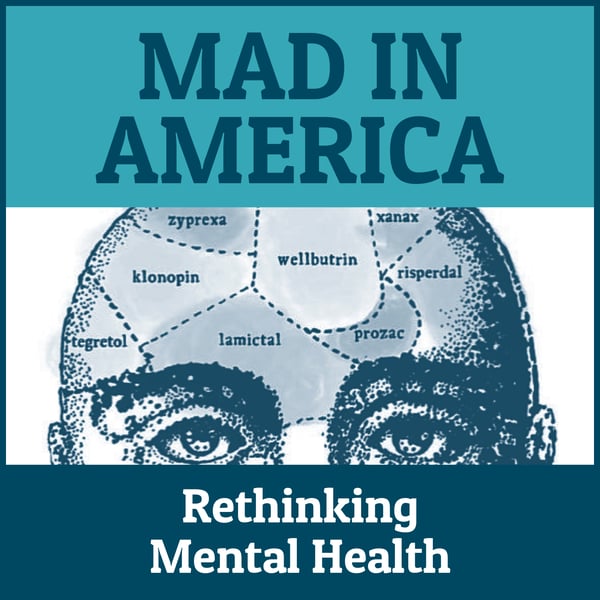Kaori Wada - How Grief Became a Disorder and What This Means About Us
Mad in America: Rethinking Mental Health
Mad in America
4.8 • 201 Ratings
🗓️ 3 August 2022
⏱️ 56 minutes
🧾️ Download transcript
Summary
In March 2022, a new grief-related disorder was officially adopted into mainstream mental health diagnosis nomenclature. Prolonged Grief Disorder (PGD) is a recent addition to the Diagnostic and Statistical Manual fifth edition text revision (DSM-5-TR). A PGD diagnosis is to be used when a person is grieving too long and too intensely.
In this interview, Kaori Wada, Psychologist, grief researcher, and Associate Professor and Director of Training at the University of Calgary, builds upon her recent paper on the Medicalization of Grief in conversation with MIA Science News Writer and Psychologist Zenobia Morrill. Wada articulates a history of institutional tensions and financial conflicts behind the creation of this new PGD diagnosis. She also discusses the ways PGD could shape how we collectively understand and respond to those grieving.
Wada’s work demonstrates that the creation of PGD was not based on scientific findings but appears to be entangled in long-standing arguments between camps of mental health professionals with different stakes in whether the diagnosis became legitimized. Further, PGD, as with other diagnoses, represents elements of mainstream psychological theory that tend to render deviations from Western cultural norms as “unhealthy.” Is diagnosis needed to provide support and care? If so, those most likely to experience marginalization, violence, and unjust loss are also most likely to be classified as having PGD, a mental illness.
At a time when the world is fraught with tragic loss—owing to causes ranging from political failures, state violence, and the COVID-19 pandemic—grieving has been transformed into a mental health disorder. But the complicated question of what a mental disorder is continues to be glossed over. The opportunity for psychiatric professionals to embrace humility seems to have reverted to the familiar “diagnose-and-treat” response. Will pharmacological intervention become the dominant “treat” response to a diagnosis of PGD?
A new grief disorder is a clear departure, however, from the way grief used to be described in the field as an example of something that is clearly not a mental health disorder, Wada shared. She exclaims: “To me, the medicalization of grief is controversial because it may fundamentally shake up the concept of a mental disorder, [how it has] been defined and understood.”
Wada and Morrill explore what this new PGD diagnosis may mean, reflecting on the ways the “diagnose-and-treat” logic seems to of experiences formerly considered part of the territory of being human. The need to pathologize experiences in order to address them represents a paradox. A new ethical and moral quandary befalls professionals tasked with determining when grief is an illness and when expressions of grief are inappropriate.
Will the public embrace this new disorder? Will the medicalization of grief be resisted? Will a pandemic of PGD diagnoses follow a global pandemic? Wada speaks to the personal and professional influences that shaped these curiosities and her approach to researching how grief is being construed in the mental health field.
Transcript
Click on a timestamp to play from that location
| 0:00.0 | Welcome to the Mad in America podcast, your source for science, psychiatry and social justice. |
| 0:13.6 | Hello, this is James, and welcome to the podcast. |
| 0:17.2 | Our sponsor this week is the J-A-E-C Foundation, which is hosting an international conference on open dialogue this August. |
| 0:25.1 | And you can visit the website, jaecFoundation.org, for more information. |
| 0:30.7 | Now on to our interview. |
| 0:33.0 | Hello and welcome to the Mad in America podcast. |
| 0:35.8 | I'm Zinobia Moral, a science newswriter for Madin America. |
| 0:39.7 | And in this episode, I'm speaking with Kauri Wada, who is an associate professor and the director |
| 0:45.8 | of training for the counseling psychology program at Workland School of Education at the University of |
| 0:52.9 | Calgary. She is a registered psychologist and sits on the |
| 0:57.2 | Human Rights and Social Justice Committee of the Canadian Psychological Association. Her research |
| 1:04.0 | interests include cultural and social aspects of grief. In December, we at Madden America covered her new paper about the medicalization |
| 1:14.5 | of grief, which was published in the Palgrave Encyclopedia of Critical Perspectives in Mental |
| 1:20.8 | Health. And in this podcast episode, we build on the themes of her new paper. We speak more about grief and new grief-related |
| 1:31.3 | disorders in mental health, including recent additions to the DSM and ICD. We explore more what it means |
| 1:41.4 | to medicalize grief, the paradoxes and the context that have shaped how grief |
| 1:47.5 | is now being talked about and responded to in mental health fields. And finally, how these |
| 1:55.7 | shifting narratives around grief might affect us. In fact, my understanding is your work, Kauri, demonstrates that |
| 2:03.8 | how we collectively demarcate what is normal grieving matters and has very real implications |
| 2:11.2 | for how we interpret our own mourning and grieving rituals. So we'll get into this in a moment, but first let me officially welcome you, Dr. |
| 2:21.2 | Kauri Wada. |
| 2:22.2 | Thanks so much for joining. |
... |
Please login to see the full transcript.
Disclaimer: The podcast and artwork embedded on this page are from Mad in America, and are the property of its owner and not affiliated with or endorsed by Tapesearch.
Generated transcripts are the property of Mad in America and are distributed freely under the Fair Use doctrine. Transcripts generated by Tapesearch are not guaranteed to be accurate.
Copyright © Tapesearch 2025.

